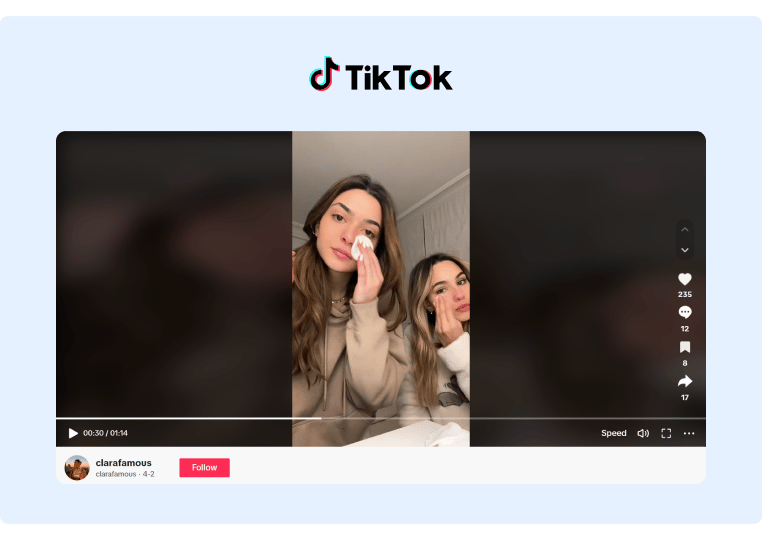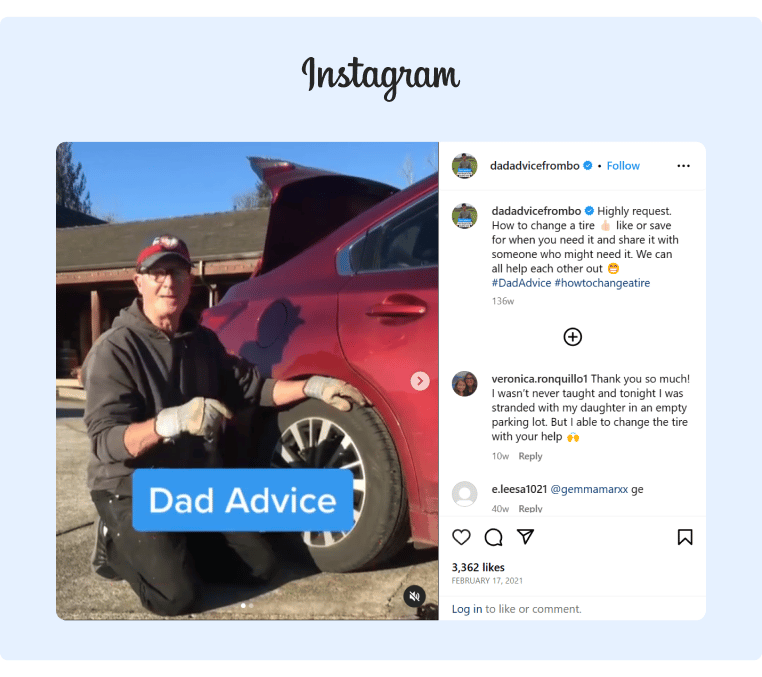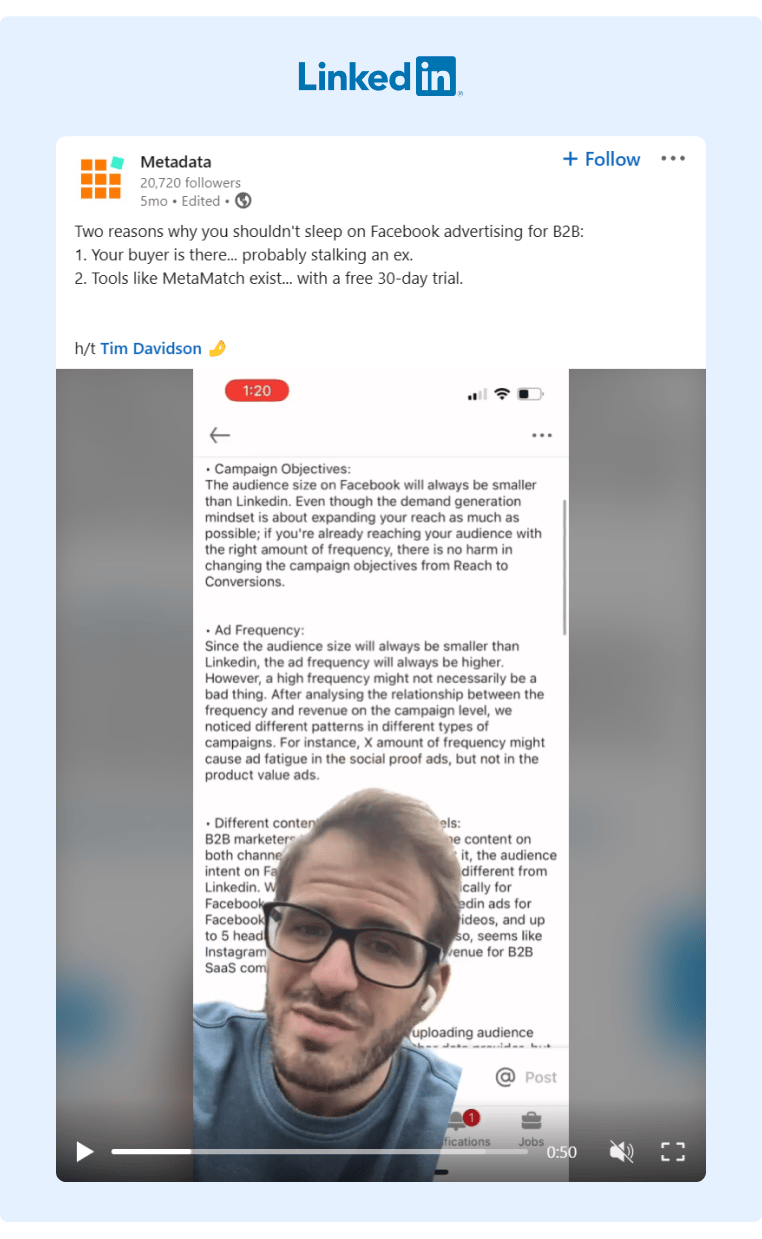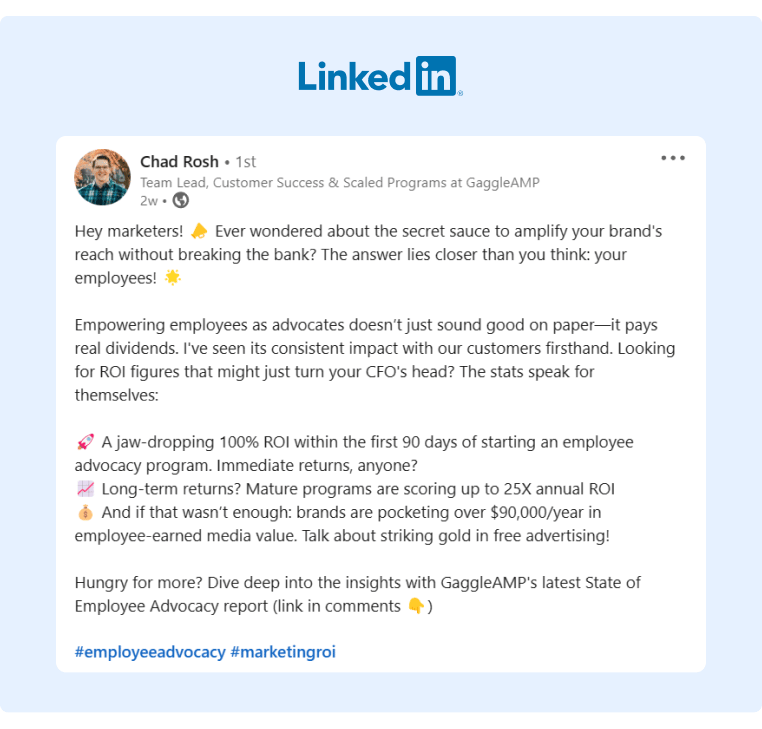What’s Undermining Trust in B2B Influencer Marketing?
Scroll through Instagram, TikTok, or Facebook, and you’ll notice examples of influencer marketing. Musicians sharing their favorite sunglasses, athletes sharing their go-to workout gear, or celebrities sharing their holy grail skincare. But how do you know if that celeb’s social media post is genuine or a paid advertisement?
It boils down to trust. Trust is what makes influencer marketing so successful, and also what makes it so problematic.
In this blog post, we're going to take a closer look at what is influencer marketing, including its impact on consumer behavior, the rise (and fall) of influencer marketing trust, the roles employees play in influencer marketing, and how the next generation will view influencer marketing.
Let’s get started!
Influencer Marketing Trust
Celebrities, athletes, and musicians promoting brands is nothing new. Think back to Bruce Jenner (Wheaties), Brooke Shields (Calvin Klein), Britney Spears (Pepsi)… All were notable faces of high-profile brands. What is new is that influencers (including everyday people) are now promoting brands from their personal social media accounts.
By using their personal social platforms to talk about products or services, these individuals are creating influencer marketing trust. Consumers feel an influencer (even a celebrity) must genuinely love (and use) a product if they’re taking the time to share it from their personal platform like reality TV star Kylie Jenner does here.

Source: Kylie Jenner
Anyone who has a social media platform and a dedicated group of followers can potentially be an influencer. This is appealing for brands who are looking to target specific, niche audiences that these influencers can reach.
Why Is Influencer Marketing Popular?
Influencer marketing is popular because it humanizes brands and helps companies form emotional bonds with their customers. People are tired of traditional branded ads that can come off as pushy and insincere. What makes influencer marketing resonate with consumers is its authenticity.
Influencers aren’t cold-calling you to sell you a product. Instead, they’re sharing content that you can choose to click on for more information. Their content is warm and inviting, like you’re chatting with an old friend. They’re giving you the inside scoop on this great product or service because they know that you’ll love it as much as they do. Here's an influencer marketing example from TikToker clarafamous.

It's this relatable, human touch that makes influencer marketing so attractive. So, how has this impacted consumer spending habits and behavior?
Impact of Influencer Marketing on Consumer Behavior
Consumer purchasing behavior across the board has felt the impact of influencer marketing. Influencers can (and do) influence which products or services we purchase. Think of moms who purchase a specific diaper brand recommended by a mom influencer simply because they trust her opinion (and it’s the brand she uses for her children).
But here's the big question: Can brands really rely on this influence to boost brand awareness and ultimately sales? The answer is yes.
HubSpot found that a whopping 50% of Millennials said they trust product recommendations from influencers, while 33% of Gen Zers have bought a product based on an influencer’s recommendation. This impressive number shows just how much influencers can sway our choices when we're shopping.
Trust is the cornerstone of influencer marketing. It's the trust that influencers have built with their followers and the faith that people put in what influencers suggest. In fact, 67% of consumers are more likely to be loyal and advocate for a brand they trust.
But this trust isn't automatic – it has to be earned. To build this trust, influencers need to be honest about their partnerships with brands. They have to openly tell their audience when they're working with a company or promoting something for payment. Trust with consumers is delicate, and even a hint of influencer dishonesty can break it.
Why Do Consumers Trust Influencers?
One significant factor contributing to the continued popularity of influencers is that consumers view them as valuable sources of information. According to research conducted by Matters Communications, consumers have a strong inclination toward expert influencer content that is educational in nature.
For instance, 42% of respondents expressed a preference for instructional content like how-to guides and tutorials. Additionally, stories (e.g., videos or photos) that provide easily digestible pieces of information are highly favored, with 35% of consumers leaning toward this type of content.
In this example, Bo is a father of six kids. He shares his knowledge a.k.a. “Dad Advice” on things you’d typically ask your dad for help with. His topics include how to change your car key battery, negotiating how to buy a car, fixing door knobs, etc.

Source: Dad Advice From Bo
Influencers like Bo highlight the trust that consumers place in influencers, not just as entertainers but as educational resources, where they can learn and gain insights on various subjects.
Millennials Trust Influencers the Most
Millennials, who grew up during the rise of social media, have a strong bond with digital platforms. They've witnessed influencers' transformation from regular folks to internet celebrities. This familiarity fosters trust because Millennials feel a personal link with their favorite influencers. Moreover, that trust continues to grow stronger the longer that they follow an influencer.
It’s no wonder that Millennials and Gen Z are two times more likely to trust influencers than their older counterparts, the Boomers; and 37% of these younger consumers prefer to trust influencers over brands.
Micro-Influencers Enjoy Greater Trust Among Consumers
Although often overlooked in the world of influencer marketing, micro-influencers play a significant role in earning consumer trust. These individuals may not have millions of followers, but they have something even more valuable: authenticity and a deep connection with their smaller, niche audiences.
When micro-influencers endorse a product or service, it feels like a genuine recommendation from a friend. Their honest and relatable content fosters trust because they are not perceived as being driven solely by financial gain. Their followers believe in their opinions and expertise, making micro-influencers powerful allies for brands looking to establish and maintain consumer trust in a world saturated with advertisements.
This is the main reason why brands prefer to work with micro-influencers. In fact, 80% of marketers state they work with people with less than 100,000 followers.

Metadata collaboration with B2B advertising influencer Tim Davidson.
Employee Advocacy: The Influencer Champion Under Your Nose
In addition to influencers and micro-influencers, consumers also trust employee advocates, too. If you aren’t already, consider adding employee advocacy to your influencer marketing strategy.
While employees are compensated for their work, they are not paid to endorse your brand on social platforms. This authenticity is a powerful asset since employees tend to appear more trustworthy to their followers than influencers (who are often perceived as promoting products for financial gain). In fact, potential customers gained through employee-shared messages are 7x more likely to convert.
By providing your employees with curated content and messaging, they can act as brand ambassadors. For example, Andrew Cummins, the Director of Strategy and Business Development at Archer, shares his thoughts on a recent announcement. Content just like this can be curated in GaggleAMP, making it easy to keep executives engaged while sharing relevant thoughts to their social networks.

Source: Andrew Cummins
Influencer marketing typically involves one individual reaching a vast audience for a substantial fee. But, with employee advocacy, your team members can continuously and voluntarily share and promote content. Since your team is more genuinely invested in your brand’s success, this yields more genuine and cost-effective results on social media platforms.
Can We Trust Social Media Influencers?
In addition to celebrity influencers and employee advocates, there are social media influencers, too. Social media influencers occupy a unique online space; they’re ordinary people with extraordinary influence thanks to their relatability. They've become significant digital players who are shaping opinions, trends, and consumer choices. But trust in social media influencers sparks debates. They come across as genuine and offer valuable recommendations, yet concerns about sponsored posts and transparency persist.
So, can we trust them? Well, it depends.
Analyzing social media influencers' profiles is crucial for trust assessment. Many are transparent by labeling ads, explaining sponsored content creation, and sometimes disclosing earnings. However, some lack honesty about their paid partnerships. So, spend some time reviewing their profiles to make an informed trust decision.
Why Influencers Have Lost Consumer Trust
Not everyone is a fan of influencer marketing. Influencer marketing has seen a rise and fall in consumer trust. In fact, a 2023 study found that nearly 90% of consumers no longer trust influencers. The current decline in trust stems from a couple of factors.
The first factor: being driven by influencer financial gain. Some influencers have faced criticism for promoting products solely to make money, leading consumers to question the sincerity of their recommendations. This financial motivation has cast doubt on what were once trusted opinions.
The second factor: the blurry line between a genuine endorsement and a paid promotion. Consumers have become more discerning, and they now demand transparency and authenticity from influencers. Even a slight hint of hidden motives or insincerity can harm an influencer's reputation.
Who Do Consumers Trust?
Consumers are increasingly placing their trust in employee advocates over paid promotions. 59% of B2B buyers state that a company’s thought leadership content is more trustworthy than its content marketing.
This shift is rooted in the authenticity and genuine connection employee advocates offer. Unlike paid promotions, which can come off as scripted and driven by financial incentives, employee advocates share their honest opinions and experiences.
This authenticity resonates deeply with consumers, who value transparent and unbiased information. Employee advocates are seen as more credible and relatable. Their content feels like a friendly recommendation rather than a sales pitch, making them the preferred choice for consumers seeking trustworthy guidance in a world filled with marketing noise.

Source: Chad Rosh
The Role of Employees in Influencer Marketing
Employees can play a pivotal role in influencer marketing, offering unique advantages that can enhance brand success. Here's how they can contribute:
Provide Better Brand Awareness Among the Core Audience
Employees have an intimate understanding of the company's values and culture. When they actively engage in promoting the brand on social media or other platforms, it not only boosts brand visibility but also helps in reaching the core audience more effectively. Their insider perspective can resonate strongly with consumers who value a genuine connection with a brand.
Act as a Micro-Influencer for the Company
Employees, particularly those with a strong presence on social media, can function as micro-influencers for their organizations. Their recommendations and endorsements carry weight among their followers, who perceive them as trustworthy sources. This micro-influencer status can significantly impact the brand's reputation and consumer trust.
Support Company Goals Without Incentives
Unlike external influencers who often require compensation, employees can actively support company goals without monetary incentives. Their advocacy is driven by a genuine belief in the brand's products or services. This sincerity shines through in their messaging, resonating more deeply with consumers who appreciate authenticity.
Send an Authentic Message
Perhaps the most compelling aspect of employee advocacy in influencer marketing is authenticity. Employees speak from firsthand experience and a genuine connection to the brand, which consumers find highly authentic.
This authenticity fosters trust and credibility, qualities that are increasingly vital in today's marketing landscape. In a world where transparency is valued, employees can be the authentic voice that consumers are looking for, helping to bridge the gap between brand and audience.
How Does the Next Generation View Influencer Marketing?
Born in the era of smartphones and social media, Gen Z has been exposed to influencer marketing from a very early age. They’ve been encountering influencers across various platforms, from YouTube to TikTok to Snapchat for years.
Now the next generation – Gen Z — is shaping their own perspective on influencer marketing.
Gen Z Values Interactive and Authentic Content
Gen Z values content that is authentic and interactive. Influencers who engage with their audience in real and relatable ways resonate with this generation. Whether it's unfiltered vlogs, live Q&A sessions, or behind-the-scenes glimpses, Gen Z appreciates content that feels like a genuine connection.
Gen Z Trusts Influencers (Within Reason)
Gen Z feels a strong connection with influencers, often sharing common interests and values. This connection translates into trust, especially because influencers come across as relatable and impartial. Gen Z influencers engage with their followers in various ways, from hosting meet-ups to live-streaming their daily lives on social media platforms.
This interactive quality strikes a chord with Gen Z and fosters loyalty among their followers. In fact, 44% of Gen Z has made a purchase decision based on a recommendation from social influencers. This trust springs from Gen Z's appreciation for self-expression, relatability, and authenticity, making influencer marketing a valuable strategy for brands seeking to connect with this generation.
However, these new kids on the block are not naive. Growing up in a digital age fraught with misinformation and sponsored content, Gen Z is also discerning, which makes it possible for them to strike a balance between skepticism and trust. Trust in influencers is something they approach cautiously, relying on their judgment and peer discussions.
Final Thoughts: Gen Z and the Future of Influencer Marketing
In the age of Gen Z, influencer marketing and employee advocacy converge on a common theme: authenticity, trust, and relatability. Gen Z values these qualities in both influencer content and employee advocacy.
As this generation rises in influence, employee advocacy becomes increasingly crucial. Gen Z's knack for crafting and embracing authentic content aligns seamlessly with the core of employee advocacy. Employees, sharing their genuine experiences and beliefs, become the trusted voices that Gen Z craves.
In an era where traditional advertising often falls short, the fusion of employee advocacy into influencer marketing can work wonders. It taps into the authentic voices within an organization to reach an audience that values real connections.
This seamless blend is on the verge of revamping marketing tactics, capitalizing on Gen Z's deep-seated appreciation for authenticity and trust, ultimately leaving a long-lasting impression.
Interested in exploring an employee advocacy tool like GaggleAMP to help with your influencer marketing? Schedule a demo today!










